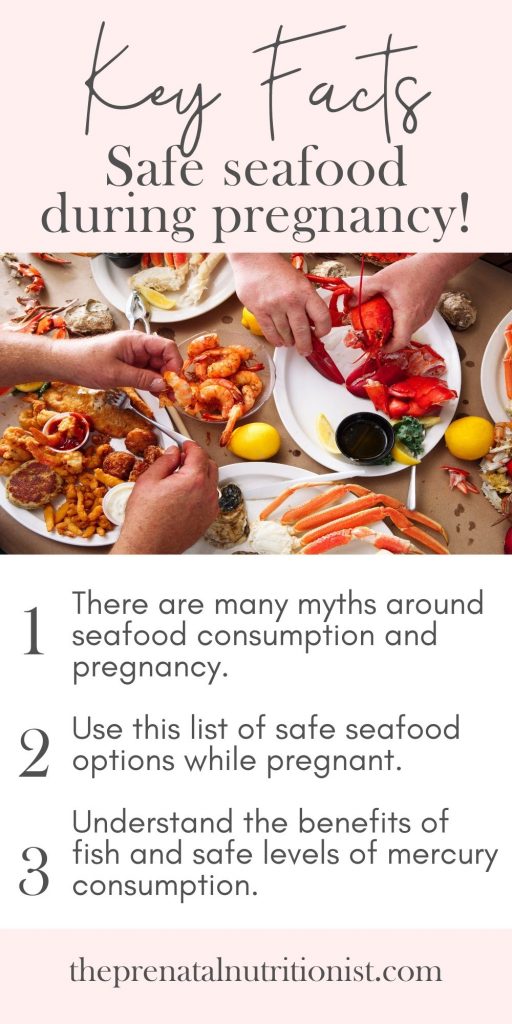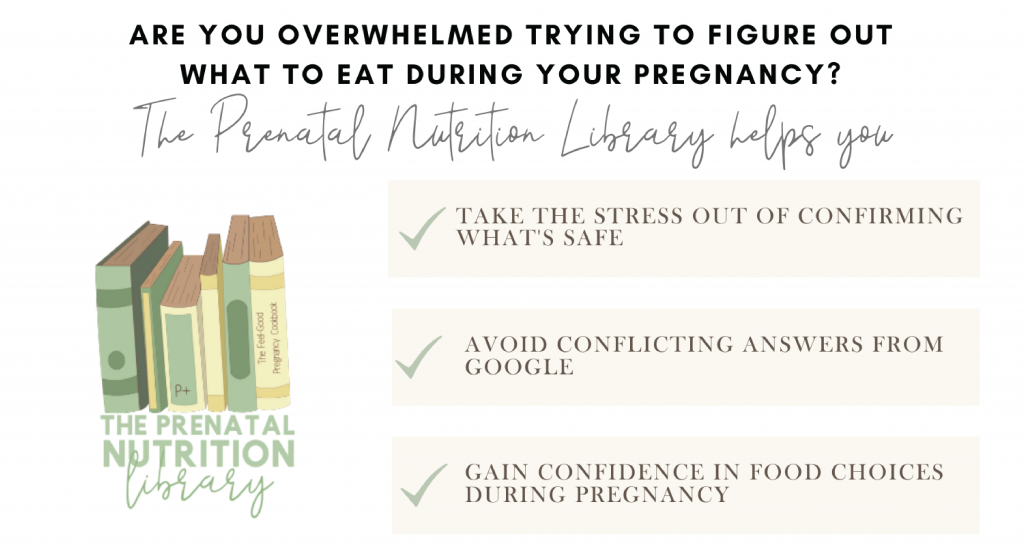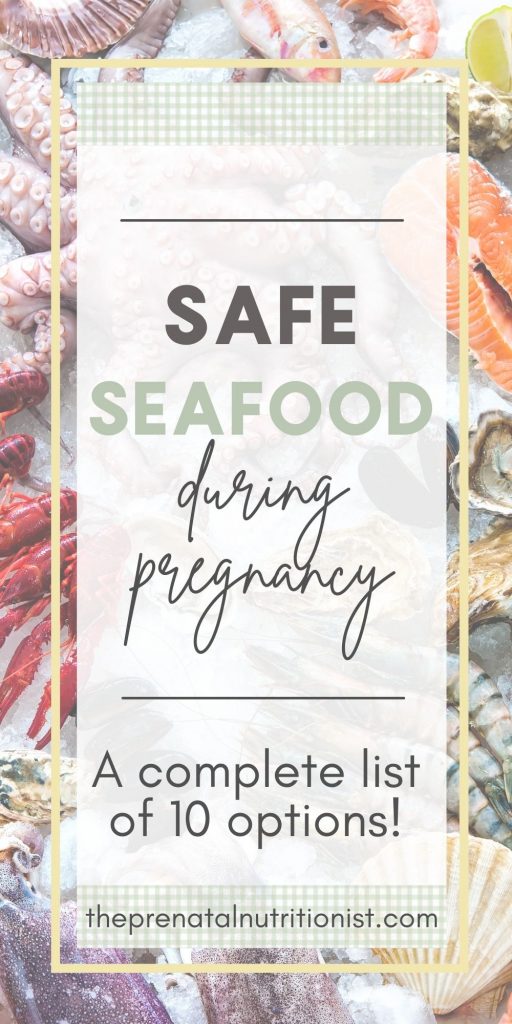
Pregnancy can be a confusing time for pregnant women, especially when it comes to food. Pregnant women are often told what to eat or not to eat to support their baby’s growth. There are so many myths out there, it’s hard to know what’s true and what’s not which is the whole reason I created The Prenatal Nutrition Library, you’ll have reliable answers from day one and get rid of the anxiety.
A common food future moms are told to be careful eating is seafood. Whether it’s because of the mercury levels or food safety reasons, fish, and shellfish can seem like a slippery slope during pregnancy, but it doesn’t have to be that way and you can eat a variety of seafood!
Several types of seafood are an excellent source of essential nutrients that your baby needs to grow in the womb and for baby brain development, like omega-3 fatty acids, iron, vitamin D, iodine, and protein. Because of these nutrients, safe seafood is actually a recommended addition to your pregnancy diet.
That being said, there are some risks that come with eating certain fish and shellfish due to mercury content or food safety precautions and dietary guidelines for Americans. First, consuming elevated levels of mercury can cause damage to your baby’s nervous system. And cause harm to other parts of the body including your lungs and kidneys. So, it is best to avoid high mercury fish during pregnancy. The fish that have the most mercury is the largest fish in the water like shark, swordfish, and king mackerel.
I know it can be challenging to figure out which kind of seafood is safe to eat during pregnancy. So that’s what today’s post is all how to eat fish safely! Keep reading to find out some of the safest seafood to eat during pregnancy!
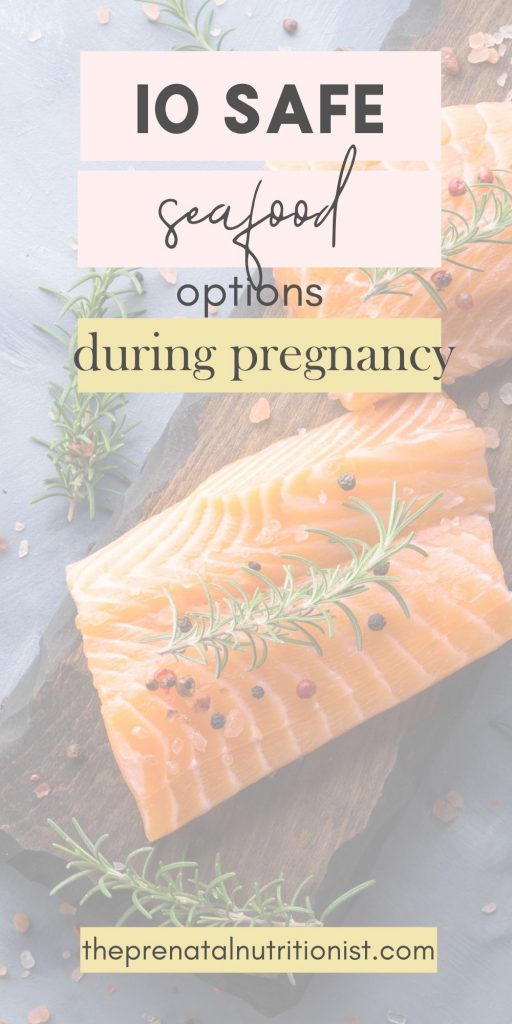
Safe Seafood During Pregnancy
Salmon
One of the more popular and favored fish, salmon is known for its multiple health benefits, delicate flavor, and beautiful pink color. It also contains low mercury, especially if you can find Atlantic Salmon. Although not completely necessary, if you buy wild-caught salmon instead of farmed salmon, it contains higher levels of omega-3 fatty acids! Just two servings a week of this oily fish is enough to meet the recommended amounts of EPA and DHA during pregnancy. Two to three servings of salmon per week, if you like it, is a great goal.
Shrimp
Shrimp is another type of seafood that’s full of omega-3 fatty acids. In addition, shrimp also contains good amounts of iron, zinc, and iodine, which are all important nutrients for pregnant women. Iron is vital for increasing red blood cells and preventing anemia, while iodine plays an important role in the formation of thyroid hormones both for you and your growing baby. And the best part, shrimp is a low-mercury shellfish, just make sure it is cooked!
Anchovies
Anchovies are a surprisingly common pregnancy craving. But are they safe during pregnancy? Despite the many pregnancy food myths against seafood, the answer is yes! Anchovies are tiny fish and therefore have very limited mercury. A total win for pregnant women. They also have a ton of health benefits for women who are pregnant or breastfeeding! Research shows eating anchovies can reduce blood pressure, regulate your triglyceride levels, and lower your risk of stroke. Plus, it would be very difficult to overdo a serving of anchovies. Especially since they are typically eaten as a garnish.
Sardines
Sardines, like anchovies, are one of the lowest mercury fish, even though they may not be top of the list when it comes to favorite fish. They’re perfectly safe to eat during pregnancy and definitely recommended if you can stomach them. This type of seafood also has different health benefits thanks to its high levels of vitamin B12, omega-3 fatty acids, calcium, iron, zinc, and protein. As you know, protein is a must for expectant moms to promote optimal fetal development and sustain their energy levels throughout the day. Plus, protein helps to avoid pregnancy swelling during pregnancy!
Squid
Squid, also known as the dish calamari, is only safe for women who are pregnant or breastfeeding when it’s cooked properly, as most fish and shellfish. So, ordering calamari as an appetizer at your favorite restaurant is still okay. Squid is actually packed full of nutrients like most fish. Some of the most notable ones are protein, iron, vitamin E, copper, B12, selenium, and zinc! If you like squid, be sure to include it in your diet while pregnant.
Cod
Cod is one of the more popular fish out there and often the one used for the popular dish ‘fish and chips.’ It has a more mild flavor so it can be a good option for those who aren’t fish fanatics. In fact, cod is a great choice if you are looking to really up your protein intake especially in the third trimester. It’s low in mercury, contains iron, selenium, potassium, and calcium. However, since cod is a leaner fish, it does not have the amount of omega-3’s as salmon, sardines, or herring, for example. If cod is the only fish you like, you may want to consider an omega-3 supplement which you can learn more about in The Prenatal Nutrition Library.
Trout
Like cod, trout is a type of fish that is a bit milder in taste and good for those who don’t particularly love any sort of ‘fishy’ taste. The good news about trout is that it does have a bit more omega-3 fatty acids than cod, so give trout a go if you are trying to conceive or pregnant. Try trout if you need to up your protein intake, or if you don’t eat much meat because it is a great source of vitamin B12.
Scallops
Scallops are actually one of the lowest mercury shellfish available, so a great option. If not cooked thoroughly, scallops can pose a food safety risk though so make sure they are cooked to 145 Fahrenheit. Scallops are a good source of protein, minerals like magnesium, omega-3 fatty acids, and vitamin B12. With their delicate and moderately sweet taste, you’ll want to make the most out of your weekly three servings!
Skipjack and Canned Light Tuna
While white albacore and yellowfin tuna contain higher mercury levels, skipjack and canned light tuna are the two varieties of this seafood that are safe for pregnancy. While the biggest forms of tuna should be limited or avoided, the smaller varieties are safe to consume during pregnancy. And also a super-easy way to get quality protein in. This seafood is beneficial for pregnant women thanks to its high levels of omega-3 fatty acids, vitamin D, and selenium. Though be sure to only buy BPA-free canned tuna when you can! Canned food should be limited during pregnancy so it’s best to be extra safe.
Clams or mussels
Clams and mussels are safe to eat during pregnancy as long as you make sure they’re fully cooked! Believe it or not, clams are a truly nutritious food! Research shows they’re rich in minerals, protein, vitamins D and B, iron, and omega-3 fatty acids. Just always be certain that you’re eating cooked clams, mussels, and oysters as the raw versions of these shellfish can harbor bacteria like Vibrio vulnificus.
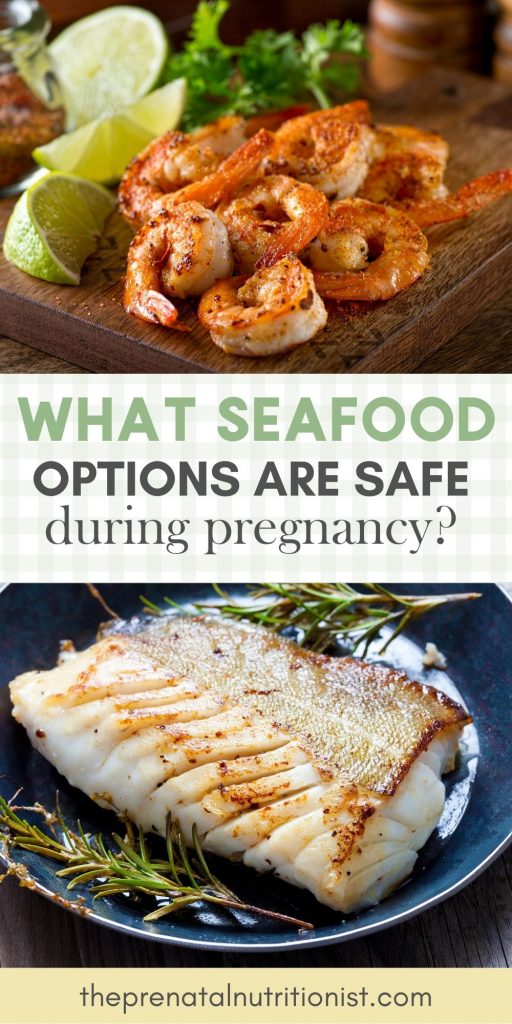
Which are your favorite safe-to-eat seafood options for pregnancy?
Those are some of the safest seafood for women who are trying to conceive, pregnant, or breastfeeding! Remember, consuming seafood is better than not consuming it at all since it provides so many nutrients important for pregnancy such as baby’s brain development. The ones mentioned above are not the only ones you can consume, but great options that are low in mercury as stated by the food and drug administration.
Try one of these options in your next week’s meal rotation. You can get a little lunch-time inspiration by reading my post about the easiest healthy pregnancy lunch ideas for work. Swap the proteins in some of the recipes for the seafood of your choice, and voila, you have a great lunch or dinner that includes fish.
If you have any questions, feel free to ask in the comments! To take a deeper dive, join The Prenatal Nutrition Library for expert prenatal nutrition advice on fish, protein, supplements, and more. In fact, you can download the app for free in your app store to check it out.
